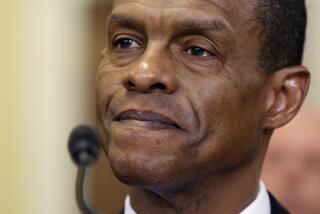Heeding a Distant Thunder
- Share via
They sat under dark and thundery skies, drinking coffee, snacking on pastries and looking tired.
But the weariness they felt wasn’t just from 12-hour shifts necessitated by rioting in the streets of L.A.
It was a weariness one feels when he knows everything’s gone wrong and nothing he does will ever diminish a grief that cloaks him like a funeral shroud.
It was a bone-deep exhaustion that accompanies emotional chaos.
Victims of the riot? In a way. They’re cops. Not the ones who surround Chief Daryl Gates and make command decisions, but those in the field charged with enforcing those decisions.
I stopped by to see them the other day at the L.A. Coliseum, the command center of activity during the riots. Thunder rumbled in the distance, as though God himself were echoing their despair.
There’s more to a policeman than the uniform he wears, just as there’s more to anyone than the face he presents. I wanted to see cops up close.
At the Coliseum that day, they were trying to deal with embarrassment, fear, anger, remorse and sadness for the riot, their leaders’ clumsy response to it, the damage to their profession and the devastation to their city.
One cop wonders how he will ever be able to explain to his family and friends why he wasn’t allowed to do anything as truck driver Reginald Denny was being beaten.
Another, a cop for 28 years, says he can never remain a policeman after what has happened and is quitting out of shame and frustration.
“Something’s been taken from us,” he told me that dark day. “It’s like someone has reached into our pockets and stolen our pride.”
Most of those I talked with wanted anonymity, but it wasn’t names that were important here. It was the intensely human response to cataclysmic events I was going for. Rodney King, with stilted eloquence, said we’re all in this thing together and he’s right. That includes cops.
I was moved to consider their emotions by a telephone message from the wife of a policeman who said her husband was in deep pain as a result of the Rodney King beating, the not guilty verdicts and the riots.
She said, “I don’t know if he’ll ever be the same again.”
I’ve covered police activity for four decades. I’ve written a book about cops, created a television series about cops and know as well as anyone what they’re up against on the street.
And even as I’ve criticized them, I’ve understood that most are good people who respect human rights and are humiliated by the conduct of their leaders at the outset of the violence that swept L.A.
The image of Reginald Denny being beaten with impunity, without a cop in sight, especially pains them. More than one agonizes over a call to duty gone unanswered.
“If that had been a policeman lying in the street,” Gary Rogness said in a tone of regret and anger, “there’d have been 25 black and whites on the scene. It was shameful.”
They consider the cops who beat Rodney King thugs and the verdict that acquitted them a travesty. But what haunts them most, like the disquieting memory of a nightmare, is the mob beating of Denny.
“They pay us big bucks to protect people from what that guy went through,” Jim Docherty said. “They give us guns to stop violence. But we weren’t there when it was being committed.”
“Every cop I know is furious at the lack of response,” Tom Elfmont said. “It was unforgivable.”
A captain then off-duty, Elfmont watched the beating of Denny on television and radioed in that a homicide was in progress and every car in the vicinity should respond.
It was an emergency broadcast, Elfmont says angrily, but no one moved. He swears he’ll find out why.
Gary Rogness is the cop who’s quitting after 28 years. With a wife and two school-age children, he fears the economic uncertainty of changing careers.
“Being a cop is all I’ve ever done,” he said. “I was proud to be one. But I just don’t feel that way anymore.”
Who do they blame? A crumbling society, Gates, Tom Bradley, gangbangers, thug cops, the media, the age we live in and the pace of events washing too swiftly over them.
And most know that the uniform they wear will also be blamed for years to come.
Rodney King asked, “Can we get along?” Many emotionally battered cops wonder the same thing. Then they sit in silence and listen to a distant thunder as though it’s a metaphor for the future. And, being human, they’re afraid.
More to Read
Sign up for Essential California
The most important California stories and recommendations in your inbox every morning.
You may occasionally receive promotional content from the Los Angeles Times.










